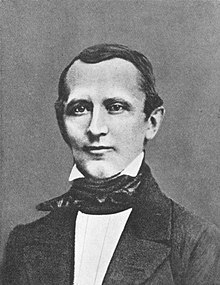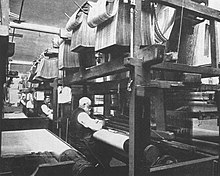August Wilhelm Kisker
August Wilhelm Kisker (born September 19, 1812 in Halle in Westphalia , † February 17, 1881 in Bielefeld ) was a German entrepreneur in the textile industry.
Life
He came from a linen dealer family in Halle. In addition, the family ran a distillery, a tobacco factory and lent money. The father was Christoph Wilhelm Kisker. The mother was Wilhelmine Dorothea (nee Schwarze). She came from a linen dealer family from Enger . The family was strongly evangelical-religious and patriarchal.
He received his school education at the Salzmann Institute in Schnepfenthal . He received practical training as a businessman between 1827 and 1831 in Antwerp . This was followed by activities in England , Ireland and Scotland . He worked as a businessman in Liverpool for two years . He not only got to know the profession of businessman, but also the new entrepreneurial behavior. This later influenced him.
In 1835 he returned to Halle and did his military service as a one-year volunteer.
In 1837, together with Ferdinand Lueder, he founded the company Ferdinand Lueder & Kisker, a factory in linen, handkerchiefs and tableware . He invested 24,000 thalers in the joint venture, which his father had lent him. Lueder brought in land and manufacturing facilities. The company had a weaving mill with 29 looms near Bielefeld. There were also 54 looms for village home weavers and 50 to 60 house spinners . So it was a mixture of manufacturer and publisher . The company introduced jacquard weaving on a larger scale in Bielefeld . Their machines were modern for the time. The warp thread control was carried out using perforated cardboard boxes. However, there was no real mechanization in the following decades either. Kisker was of the opinion that the machine loom was suitable for simple fabrics but not for quality products.
While Lueder took care of the technical area, Kisker was mainly involved in business. The scope of trade could be expanded through trips abroad, for example to France , Holland or Belgium . The company focused on high-quality goods. In 1843 the company was appointed supplier to the Prussian court for damask tableware. The companies even had customers in Moscow , Cape Town , Rio de Janeiro , Mexico City and numerous European capitals.
In 1844 the company was relocated to Bielefeld. In 1848 Kisker participated in the founding of Friedrich-Wilhelms-Bleiche before he bought his own Bleiche (Wilhelm-Kisker-Bleiche) near Brackwede in 1851 . This was operated according to the latest Irish methods. Even if the company suffered from a lack of capital at the beginning, it was overall successful in contrast to the crisis-ridden simple Ravensberger linen production. In the long run, the importance of the German domestic market increased, while international business lost importance. In 1863 this made up only 8% of sales.
The company Lueder & Kisker was the first in the Bielefeld area to use English machine yarn and no longer the yarn spun by home traders. This contributed to the decline of the home trade, but increased the competitiveness compared to the other Bielefeld linen manufacturers.
In 1859, the previous partners separated and Kisker operated from now on the company AW Kisker, a factory for linen and table utensils. In 1861 he employed 160 workers. In 1862 the company successfully participated in the London World's Fair .
Kisker was involved in founding Ravensberger Spinnerei AG in 1854 , together with other younger entrepreneurs such as Hermann Delius . This made the Bielefeld linen industry independent of the English import yarn. He became vice chairman of the new company's board of directors. He was also a member of the select committee that determined business policy. In 1862 he also belonged to the provisional committee that established the Bielefelder Aktiengesellschaft für Mechanische Weberei . In the new company, too, he sat on the select committee of the board of directors. Kisker played a key role in setting the course in both companies. So he urged to improve the quality of the products.
In 1840 he married Wilhelmine Kröning from a linen dealer family from Bielefeld. After their death in 1843, he initially took over the upbringing of the three children himself. The possible marriage to a daughter from a linen merchant family fell apart when dishonorable rumors broke out. This went up to a duel demand that Kisker voiced. He married Emmeli (née Consbruch) in 1853. The marriage had six children. Two of them died early. He followed a strongly patriarchal family image. He placed particular emphasis on discipline and religion.
He was Christian conservative and in 1848 was an opponent of the democratic movement . In 1870 he welcomed the founding of the empire with enthusiasm. Overall, however, it was more communally oriented. In addition to his entrepreneurial activity, he worked as a city councilor until 1865 in local politics. He was also a member of the presbytery of the old town evangelical parish. He also made a significant contribution to the construction of a hospital by collecting money in the years 1852–1854.
The fact that Kisker was not more active in society and politics had something to do with his illness. Since the 1850s, a spinal cord disease got worse. In 1864, Kisker fell seriously ill. He went blind and his legs became paralyzed. Cures in Wiesbaden , Switzerland and France did not help. Since 1865 he had to withdraw more and more from the operative business. In 1871 he finally had to take on his colleague Hermann Potthoff as a partner. But he still had the decisive influence. In 1872 he had to sell a bleach in the Senne to Johann Wilhelm Hermann Windel ( Windelsbleiche ). However, the weaving mill was expanded.
literature
- Jochmus: History of the linen and tableware factory AW Kisker, Bielefeld . In: The Book of the City. Published by the city council of Bielefeld. Otto Fischer and Maximilian Koch Bielefeld 1926, pp. 399–403
- Gerhard Schrader: 100 years of Bielefeld linen and tableware. On January 1, 1937. The company A. W. Kisker Bielefeld became . E. Gundlach Bielefeld 1937
- Gerstein, Barbara: Kisker, August Wilhelm. In: New German Biography (NDB). Volume 11, Duncker & Humblot, Berlin 1977, ISBN 3-428-00192-3 , p. 683 f. ( Digitized version ).
- Thomas Welskopp: August Wilhelm Kisker (1812-1881) , In: Jürgen Kocka / Reinhard Vogelsang (ed.), Rheinisch-Westfälische Wirtschaftsbiographien, Vol. 14: Bielefeld entrepreneurs from the 18th to the 20th century, Münster 1991, p. 126- 142 Digitized version of Bielefeld University
Web links
- Bernd J. Wagner: January 1st, 1837: Foundation of the Ferd company. Lueder & Kisker. Bielefeld City Archives , 2012, accessed on March 2, 2019 .
- Friends of the Museum Linen Factory eV Bielefeld: AW Kisker company in the TEXTIELEFELD web portal. 2014, accessed March 7, 2019 .
| personal data | |
|---|---|
| SURNAME | Kisker, August Wilhelm |
| BRIEF DESCRIPTION | Entrepreneur in the textile industry |
| DATE OF BIRTH | September 19, 1812 |
| PLACE OF BIRTH | Hall in Westphalia |
| DATE OF DEATH | February 17, 1881 |
| Place of death | Bielefeld |

